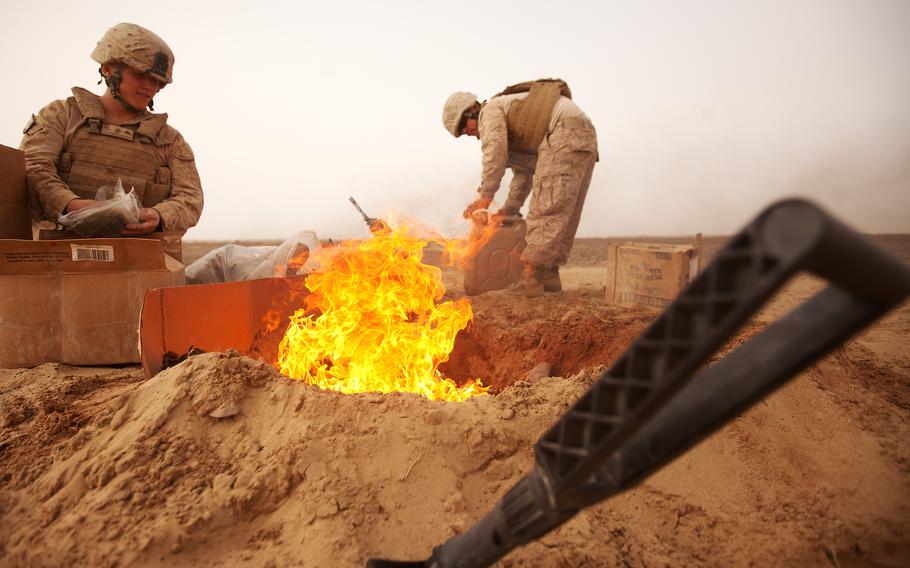
Marine Lance Cpl. Nathanial Fink (left), a light-armored vehicle driver with Alpha Company, 1st Light Armored Reconnaissance Battalion, and Lance Cpl. Garrett Camacho, a food service specialist with Headquarter and Service Company, dispose of trash in a burn pit in 2012 in Afghanistan. (Alfred Lopez/Marine Corps)
WASHINGTON – The Department of Veterans Affairs has processed roughly 425,000 benefits claims for illnesses related to toxic exposure since the PACT Act was signed into law last year, agency officials told senators on Wednesday.
“I think the PACT is making a real difference to veterans. I appreciate the work [the VA] is doing,” said Sen. Jon Tester, D-Mont., chairman of the Senate Veterans’ Affairs Committee. “I know we’re sitting over here looking over your shoulder and that doesn’t make it easier. But you guys are stepping up.”
The Sergeant First Class Heath Robinson Honoring Our Promise to Address Comprehensive Toxics Act of 2022, or PACT Act, was signed into law by President Joe Biden on Aug. 10.
The law seeks to provide an easier path to health care and benefits for veterans who served near open-air burn pits, which were used throughout the 1990s and the post-9/11 wars to burn garbage, jet fuel and other materials. Veterans diagnosed with cancer, respiratory issues and lung disease at young ages have blamed exposure to the toxic fumes from these pits, but the VA contended for years that there wasn’t sufficient evidence to support their claims.
Additionally, the PACT Act expanded health care eligibility to post-9/11 combat veterans and added 23 conditions related to burn pits and other toxic exposures to the VA’s list of service presumptions.
The VA announced Tuesday that it will review whether three more types of cancers will be added to the list of conditions presumed to be caused by exposure to toxins from military burn pits. The department said it will conduct new studies to determine whether veterans with acute leukemias, chronic leukemias and multiple myeloma outside of the head and neck could have resulted from military service in Iraq, Afghanistan and Southwest Asia.
Joshua Jacobs, VA undersecretary for benefits, told senators that the department has received more than 772,000 PACT Act claims and 425,000 have been processed, with nearly a 79% approval rate.
Tester, who introduced the PACT Act in the Senate last year, told Jacobs that one complaint that he hears from some workers in the Veterans Benefits Administration is the VA is too focused on production quotas that there is concern it reduces the quality of claims decisions.
Jacobs said he is asked about that issue at every regional VA office that he visits. He said it doesn’t have to be one or the other and both issues can be addressed at the same time. He also said the VA is working on giving more attention to the veteran’s experience.
“We can deliver a high-quality decision in a timely manner. But if the veteran doesn’t feel respected, they feel like they’ve been ignored, that could be the difference in them pursuing other earned benefits or turning their back and not coming back to the VA,” Jacobs said.
Sen. Jerry Moran of Kansas, the top Republican on the committee who introduced the PACT Act with Tester, said he is concerned about an upcoming deadline on Sept. 30 that he thinks is not getting enough attention.
Under the law, post-9/11 veterans who have been out of service for at least 10 years have until Sept. 30 to enroll for VA health care under a special one-year window opened by the PACT Act. The law automatically assumes those who served in certain locations were exposed to toxins. Once veterans are enrolled, their individual cases will dictate what benefits they will receive.
Moran asked the officials how many people have enrolled since the one-year enrollment period began.
Shereef Elnahal, VA undersecretary for health, said the agency estimates hundreds of thousands have enrolled but they do not have a precise number at this time.
“Once we get more precision in that data, we will present it to you and add to it,” he said. “We do have until Sept. 30, so we are going to work very hard to maximize the opportunity.”
Sen. Tommy Tuberville, R-Ala., asked the officials about reports that he has seen about employee burnout and if the department is gaining employees.
Jacobs said the benefits administration has grown by 22% in the last 18 months, starting at about 24,000 employees and increasing to roughly 30,000. Elnahal said the VA has a goal of hiring 52,000 this fiscal year and are already at 43,000, putting them on pace to surpass the goal.
“This is the fastest, and the most explosive, growth we have ever had in the last 20 years,” Jacobs said.
The VA has been encouraging veterans and survivors of toxic exposure to file a claim for PACT Act related benefits. Department officials during the hearing said there is an upcoming deadline Aug. 9. Most veterans who file a claim, or submit their intent to file a claim, before Aug. 10 will have their benefits, if granted, backdated to Aug. 10, 2022, when Biden signed the act into law.